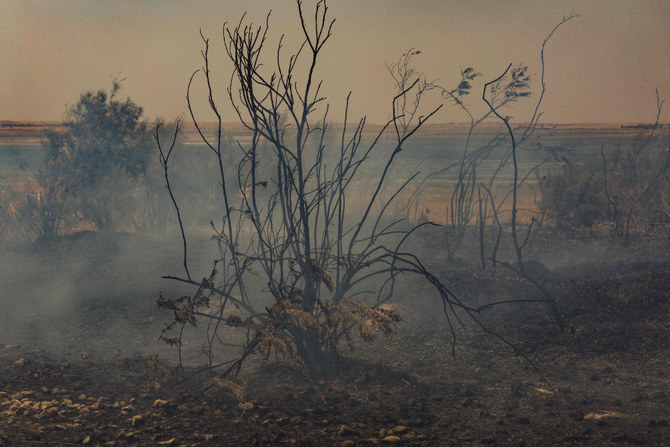
No matter how hard one tries, one cannot escape news of the Earth’s changing climate, as we now live in a more polluted world and a hotter planet for all living species. Last week, record-breaking temperatures were registered globally, according to data from the US National Centers for Environmental Prediction. It said the average global temperature reached a new high of 17.23 degrees Celsius on Thursday — the third time in the space of a few days that it had surpassed the sizzling heat waves that hit the world in August 2016, when the average temperature climbed to just under 17 C. The upward trend is continuing unabated, according to the UN’s World Meteorological Organization.
Wherever you look, records keep on being broken. In the last few weeks, southern parts of the US have been under an intense heat dome. In China, an above average heat wave has produced temperatures above 35 C, while some North African countries have seen temperatures hovering near 50 C. Even Antarctica, currently in its winter months, has broken its July record temperature, with 8.7 C recorded, according to Ukraine’s Vernadsky Research Base.
The announcement regarding the record-breaking temperatures might be an abstract occurrence for all of us mortals, yet its impact has been translating into increased damage to ecosystems everywhere, and ultimately a likely death sentence for nature as we know it. Just look at the fires in Canada and the resulting smoke giving the skies of New York a yellow hue.
The war in Ukraine is not the sole culprit in the cost-of-living crisis being felt worldwide. It is down to a mixed bag of rising prices of energy, but also crop yields have been affected due to droughts and dwindling water supplies, as well as wetter or drier seasons than those the farmers were previously used to. In short, the economic prosperity and growth that we have long relied on, at least in the Global North, to pay for the green transition is showing signs of recession and, when that happens, it puts pressure on government projects to finance the shift to a greener economy in rich and poor countries alike.
The question that needs to be answered is did we miss the chance to halt global warming when the coffers of the developed nations were full in previous decades? The current economic outlook in countries that are considered economically healthy increasingly points to higher inflation, less growth, fewer returns and even recession. Poorer economic performance is a bad omen for the fight to limit global warming and reduce greenhouse gas emissions.
Clearly, we live in an era of geopolitical discord, an absence of multilateralism and overall weak leadership, along with a less than satisfactory economic outlook across the board. Therefore, one can notice that fears are surfacing concerning the green transition, as richer nations’ governments are pushed to freeze or redirect the funds earmarked for limiting emissions and meeting climate targets.
Poorer economic performance is a bad omen for the fight to limit global warming and reduce greenhouse gas emissions.
Mohamed Chebaro
For example, UK Prime Minister Rishi Sunak is reportedly planning to renege on his government’s £11.6 billion ($14.9 billion) pledge to help poorer countries deal with climate change. This may be shortsighted and could damage the many building blocks achieved through the Conference of the Parties of the UN Framework Convention on Climate Change, better known as COP, particularly if others follow suit.
It is the economy that often wins or loses elections in democratic countries, but the economy and its performance is also what might encourage rich nations to finally set a timetable for their promised delivery of $100 billion annually to help developing nations green their economies and build resilience against future climate change. That promise is more than two years past its due date and still 20 percent short of its target, amid uncertainties about the mechanisms needed to ensure such funds are not siphoned off by corrupt and unaccountable state actors.
At last year’s COP27 in Egypt, the heads of developing nations won a small victory when delegates agreed to put the controversial issue of compensation for “loss and damage” on the summit agenda. But like all initiatives that are put on paper, their application needs a vigor that is absent from today’s world.
For all the above reasons, combined or individually, I feel that maybe the world has already forfeited its chance to bring us back from the brink by acting while the economic cycle was more positive, allowing for surplus and more experimentation. In recent years, the need to worry about the future of our planet has finally resonated among people in the rich world, but that is a commodity not shared by the people of the Global South, who have for decades had to grapple with other adversities and focus on securing their next — or tomorrow’s — meal.
UN Secretary-General Antonio Guterres said last week: “The situation we are witnessing now is the demonstration that climate change is out of control.” If people keep looking for a painless transition that does not force them to stop doing the things that they like most, such as driving or jetting off abroad, new record temperatures will continue to be seen on land, in our oceans and in the atmosphere. We all talk about reducing our carbon footprint, but nobody seems ready to change their behavior or habits, not as a society, as a system of government or even at the corporate level.
Until we do, the marshlands of southern Iraq will continue to dry up, forest fires will intensify, from Canada to Spain and elsewhere, and lakes are likely to shrink further, while our oceans will only heat up further and in an unsustainable way for humanity and nature alike.
• Mohamed Chebaro is a British-Lebanese journalist, media consultant and trainer with more than 25 years of experience covering war, terrorism, defense, current affairs and diplomacy.












